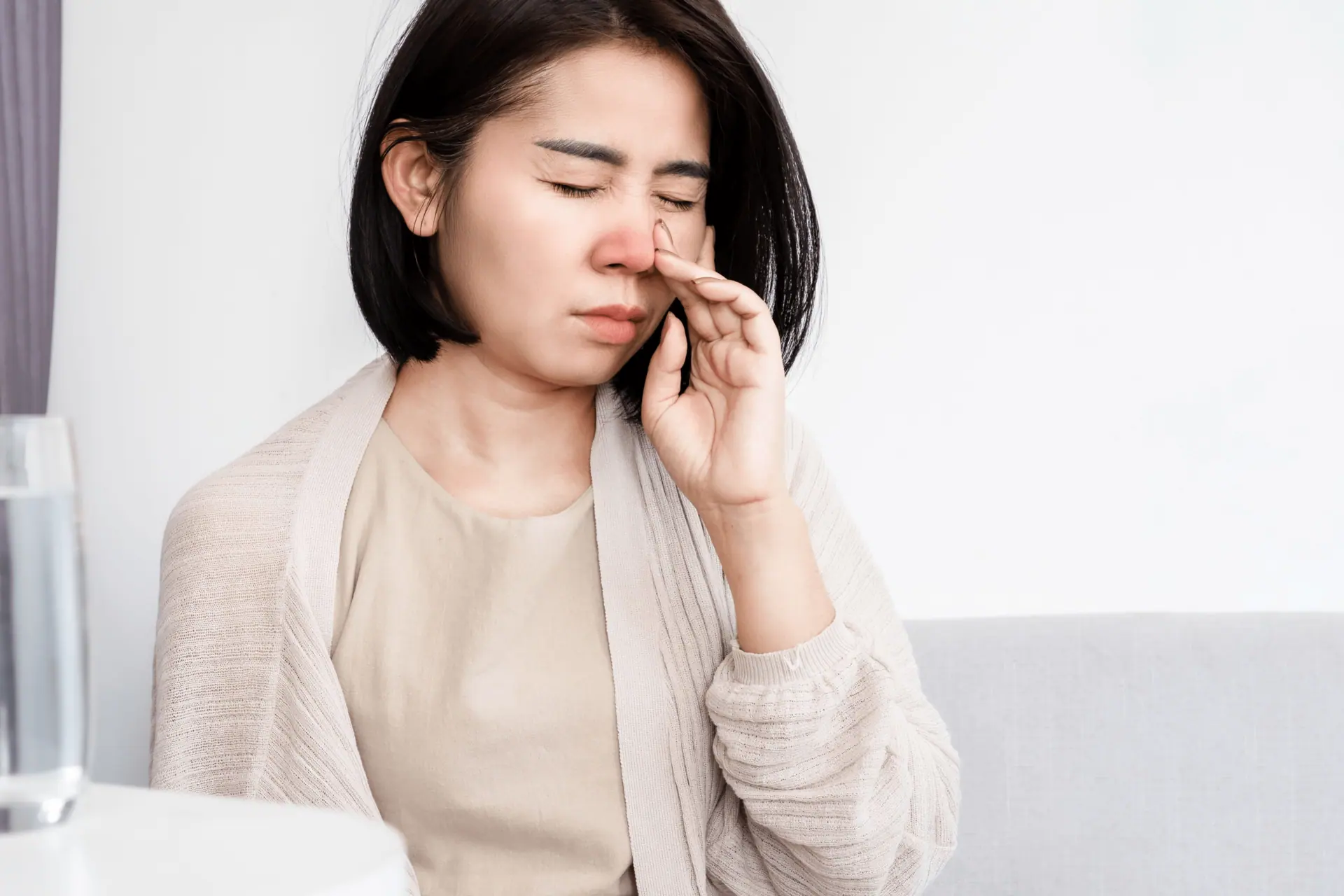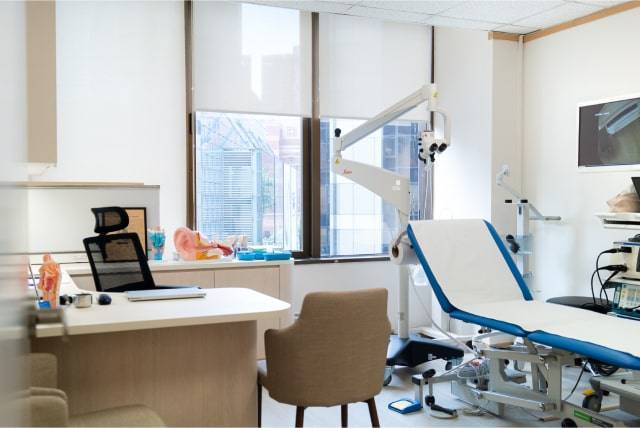Rhinitis

Understanding Rhinitis
Rhinitis is a prevalent condition affecting a substantial portion of the population in Singapore. Commonly referred to as a “sensitive nose, Rhinitis involves inflammation of the nasal mucous membrane, which can result in an overproduction of mucus, nasal obstruction, and other related symptoms. The nasal condition can be acute, often caused by infections like the common cold, or chronic, where symptoms persist or recur over an extended period.
Types of Rhinitis
Allergic Rhinitis
Allergens like pollen, dust mites, animal dander, and mould can trigger allergic rhinitis. It can be seasonal, correlating with specific allergen exposures, or perennial, where symptoms persist year-round due to continuous exposure to certain allergens.
Non-Allergic Rhinitis
Non-allergic rhinitis encompasses several subtypes, including vasomotor rhinitis, where triggers like changes in temperature, strong odours, or spicy foods can cause symptoms. Other forms include atrophic rhinitis, where the nasal lining thins, and drug-induced rhinitis, often related to prolonged use of certain nasal decongestants.
Infectious Rhinitis
Commonly known as the common cold, infectious rhinitis is caused by viral infections. Symptoms are usually acute and resolve within a week or two, though secondary bacterial infections can complicate the condition.
Causes and Risk Factors
The causes of rhinitis vary depending on the type. Allergic rhinitis is caused by an immune response to specific allergens, while the triggers for non-allergic rhinitis can be more diverse, including environmental factors, certain medications, and underlying health conditions. Infectious rhinitis is directly caused by viral infections.
Risk factors for rhinitis include a family history of allergies, a personal history of other allergic conditions, such as eczema or asthma, and exposure to environmental triggers like tobacco smoke or pollutants.
Symptoms and Impact on Quality of Life

Rhinitis symptoms can range from mild to severe and include nasal congestion, runny nose, sneezing, itching, and postnasal drip. These symptoms can lead to sleep disturbances, reduced productivity, and impaired concentration. Chronic rhinitis, in particular, can significantly affect an individual’s quality of life, leading to frustration and discomfort.
Diagnosis of Rhinitis
Diagnosis usually involves a detailed medical history and physical examination. For allergic rhinitis, skin prick tests or blood tests may be conducted to identify specific allergens. In cases where symptoms are persistent or unusual, additional diagnostic tests, such as nasal endoscopy or imaging studies, might be ordered to rule out other conditions.
Treatment Options

After our ENT ear, nose, and throat (ENT) specialist diagnoses your unique condition, she will recommend a tailored treatment plan depending on the type of rhinitis that you have.
Allergic Rhinitis
Treatment includes avoiding known allergens, using antihistamines to control symptoms, and nasal corticosteroids to reduce inflammation. Immunotherapy, in the form of allergy shots or sublingual tablets, can be effective for long-term management.
Non-Allergic Rhinitis
Management involves avoiding triggers, using saline nasal sprays to keep the nasal passages moist, and, in some cases, using nasal antihistamines or corticosteroids. For atrophic rhinitis, treatment might include measures to moisten the nasal passages and antibiotics if infection is present.
Infectious Rhinitis
Treatment is primarily supportive, focusing on relieving symptoms. This can include rest, hydration, saline nasal sprays, and over-the-counter pain relievers and decongestants. Antibiotics are ineffective against viral infections but can be recommended if a secondary bacterial infection develops.
Preventive Measures and Long-Term Management
Prevention of rhinitis involves identifying and avoiding triggers, particularly for allergic and non-allergic rhinitis. Regular cleaning to reduce dust mites, using air purifiers, avoiding smoking, and staying indoors during high pollen counts can help prevent allergic rhinitis episodes. For non-allergic rhinitis, identifying and avoiding specific triggers, such as certain foods or odours, is critical.
Long-term management may involve regular medication use for symptom control, undergoing immunotherapy for allergic rhinitis, or lifestyle modifications to reduce exposure to triggers. Regular follow-ups with an ear, nose, and throat (ENT) doctor can help monitor the condition and adjust treatment as needed.
Conclusion
If you experience chronic or severe nasal symptoms, consulting with Aglow ENT Centre’s Consultant Otolaryngologist, Assistant Professor Ker Liang, can be beneficial.
When should you see an ENT specialist in Singapore?
Please consult an ENT specialist if you are suffering from any ear, nose, or throat symptoms. It is also advisable to visit an ENT doctor if you experience persistent mouth breathing due to a chronic blocked nose or encounter snoring issues.
Dr Ker Liang sees adults and children for general ENT conditions and provides comprehensive management in a broad range of Ear, Nose, and Throat, as well as Head and Neck conditions. She has a special interest in treating throat and voice conditions, including persistent sore throat, voice issues, snoring, and Obstructive Sleep Apnoea (OSA).
Medical Teaching
Assistant Professor Ker Liang has a passion for teaching and is an Assistant Professor with NUS Yong Loo Lin School of Medicine (YLLSOM). As the NUS-NUH Otolaryngology Department Undergraduate Medical Director, Dr Ker Liang supervises the training of medical students from YLLSOM, NUS. She is actively involved
in the training of postgraduate junior doctors and residents in the Head and Neck Surgery department. She was conferred with an Undergraduate Teaching Award by the National University Health System in 2016 for her outstanding efforts as an Otolaryngology educator.
Medical Teaching
Assistant Professor Ker Liang has a passion for teaching and is an Assistant Professor with NUS Yong Loo Lin School of Medicine (YLLSOM). As the NUS-NUH Otolaryngology Department Undergraduate Medical Director, Dr Ker Liang supervises the training of medical students from YLLSOM, NUS. She is actively involved
in the training of postgraduate junior doctors and residents in the Head and Neck Surgery department. She was conferred with an Undergraduate Teaching Award by the National University Health System in 2016 for her outstanding efforts as an Otolaryngology educator.
Lorem ipsum dolor sit amet, consectetur adipiscing
Lorem ipsum dolor sit amet, consectetur adipiscing elit. Ut elit tellus, luctus nec ullamcorper mattis, pulvinar dapibus leo. Lorem ipsum dolor sit amet, consectetur adipiscing elit. Ut elit tellus, luctus nec ullamcorper mattis, pulvinar dapibus leo.
Lorem ipsum dolor sit amet, consectetur adipiscing
Lorem ipsum dolor sit amet, consectetur adipiscing elit. Ut elit tellus, luctus nec ullamcorper mattis, pulvinar dapibus leo. Lorem ipsum dolor sit amet, consectetur adipiscing elit. Ut elit tellus, luctus nec ullamcorper mattis, pulvinar dapibus leo.
Lorem ipsum dolor sit amet, consectetur adipiscing
Lorem ipsum dolor sit amet, consectetur adipiscing elit. Ut elit tellus, luctus nec ullamcorper mattis, pulvinar dapibus leo. Lorem ipsum dolor sit amet, consectetur adipiscing elit. Ut elit tellus, luctus nec ullamcorper mattis, pulvinar dapibus leo.
Lorem ipsum dolor sit amet, consectetur adipiscing
Lorem ipsum dolor sit amet, consectetur adipiscing elit. Ut elit tellus, luctus nec ullamcorper mattis, pulvinar dapibus leo. Lorem ipsum dolor sit amet, consectetur adipiscing elit. Ut elit tellus, luctus nec ullamcorper mattis, pulvinar dapibus leo.
Lorem ipsum dolor sit amet, consectetur adipiscing
Lorem ipsum dolor sit amet, consectetur adipiscing elit. Ut elit tellus, luctus nec ullamcorper mattis, pulvinar dapibus leo. Lorem ipsum dolor sit amet, consectetur adipiscing elit. Ut elit tellus, luctus nec ullamcorper mattis, pulvinar dapibus leo.



